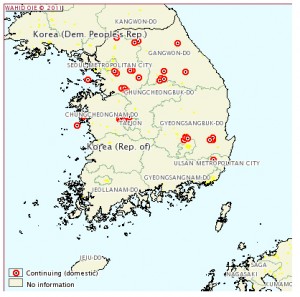Travel Advisory on Foot-and-Mouth Disease Outbreak in S Korea
Posted by Wendy Osher
The Hawaii Department of Agriculture is again alerting travelers to and from S. Korea to be careful not to transport livestock illness from the region to Hawaii.

Map of So. Korea outbreak locations. Image courtesy OIE World Animal Health Information Database via Hawaii Dept. of Agriculture. Click image to enlarge.
Outbreaks of Foot-and-Mouth Disease (FMD) have been reported in areas of S. Korea. FMD is a highly contagious viral disease of cattle, swine, sheep and other cloven-hoofed animals. Although humans are not susceptible, unsuspecting travelers may transport the virus to non-infected regions. To date, FMD has not been detected in the U.S.
Ranchers and livestock operators in Hawaii are strongly encouraged to review their biosecurity practices and are being asked to be vigilant for symptoms of the disease.
A separate outbreak in Japan last year ended in October 2010 only after extreme disease control efforts. Since this latest outbreak in S. Korea was first reported in December 2010, more than 1.7 million animals have been culled and more than 1 million animals have been vaccinated to try and stop the spread of the disease.
“We are advising recent travelers to and from South Korea to refrain from visiting Hawaii farms, ranches and zoos,” said James Foppoli, state veterinarian with the Hawaii Department of Agriculture. “Travelers going abroad, especially to countries in Asia, should avoid contact with animals, or areas where animals have been held, for at least five days before returning to Hawai`i and should avoid contact with animals for at least five days after returning to Hawaii,” said Foppoli.
The disease can be spread from animal to animal, by animal products including meat products, by the wind, on the wheels of vehicles and on human clothing.
Agricultural officials say controlling the movement of food, people and their activities related to contact with livestock is important with respect to FMD.
Precautions issued by Hawaii Ag officials to travelers include the following:
- Do not visit farms and ranches in the affected counties while traveling until this outbreak is over.
- Launder or dry clean all clothing, jackets or coats before returning to the U.S.
- If you have visited a farm abroad, or if you’ve traveled and live, work or plan to visit a farm in Hawaii, shower, shampoo, and change into clean clothing. Wash or dry clean clothes–don’t risk taking the FMD virus home on contaminated clothing.
- Remove all dirt or organic material from shoes, luggage, personal items, etc. Wipe the items with disinfectant.
- Don’t bring prohibited products home. Declare all food and agricultural material on the U.S. Customs declaration form and the Plant and Animal Declaration Forms, which are distributed prior to landing.
- Avoid contact with livestock or wildlife for at least five days prior to and five days after returning home.
“FMD is one of the most feared animal diseases because it is easily transmitted and would be economically devastating to livestock industries,” said Foppoli. “While Federal law prohibits the movement of livestock from foreign countries directly to Hawaii, the potential for human transmission is of significant concern,” said Foppoli.
Symptoms of FMD include fever, blister-like sores on the tongue and lips, in the mouth, on the teats and between the hooves. Most animals recover from FMD, but it may cause extreme weakness and severe losses in the production of meat and milk.
(Supporting information courtesy Hawaii Department of Agriculture)






_1709057595069.webp)



